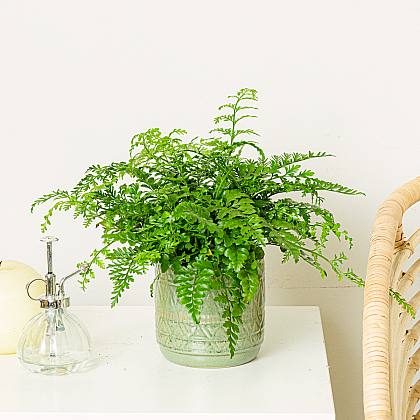Plants for a Healthy Mind: How the Relationship Between Buying and Caring for Plants Positively Impacts Your Mental Health
The relationship between plants and mental health is an increasingly popular topic in today's society. Many people have found that caring for plants is not only a relaxing activity, but can also have therapeutic benefits for emotional well-being
The relationship between plants and mental health is an increasingly popular topic in today's society. Many people have found that caring for plants is not only a relaxing activity, but can also have therapeutic benefits for emotional well-being. In this article, we'll explore how connecting with plants can improve our mental health and how we can incorporate them into our daily lives for the best results. From plants that improve air quality to herbal medicines to treat anxiety and insomnia, we'll discover how these natural wonders can help us cultivate a healthy mind.
Buying and caring for plants: a natural therapy
Buying and caring for plants can be a very effective natural therapy for improving emotional well-being. Starting a small garden at home or simply having a plant in the office or bedroom can have a positive effect on mood and reduce stress. The responsibility of caring for a plant and watching it grow and flourish can give a sense of accomplishment and satisfaction. In addition, caring for plants can be a form of meditation and relaxation, allowing the individual to disconnect from everyday problems and focus on something simpler and more natural. Additionally, the process of watering plants or pruning them can be an effective way to release built-up tensions.
Buying plants can also be a social activity. Going to a nursery or plant market with friends or family can be a fun and relaxing experience, especially if you share tips on care and personal experiences.
Importantly, you don't need a large space to have plants at home, as there are options for every size home. Additionally, keeping plants indoors can improve air quality and reduce carbon dioxide levels, which can improve sleep quality and concentration. In short, buying and caring for plants is an accessible and effective natural therapy for improving emotional and physical well-being.
The Connection Between Plants and Mental Wellbeing
The connection between plants and mental well-being is a topic that has garnered more and more interest in recent years. Numerous studies have shown that having plants at home or in the workplace can have a positive impact on our emotional health. Plants have the ability to create a relaxing and calming environment, which helps reduce stress and anxiety levels. In addition, taking care of plants helps us connect with nature and practice mindfulness, which in turn improves our mood and provides us with a sense of well-being. The presence of plants in our environment can also increase our productivity and concentration, which is especially beneficial for those who work from home or spend long hours indoors. In short, the relationship between plants and mental well-being is undeniable. Including plants in our environment helps us create a harmonious space and provides us with multiple benefits for our emotional health.
The Relaxing Power of Plants at Home
The Relaxing Power of Plants at Home
Plants have an undeniable power to create a relaxing atmosphere in our home. Their presence in our interior spaces not only adds aesthetic beauty, but can also improve our emotional well-being. Scientific studies have shown that the mere sight of plants can reduce stress and anxiety, as well as improve mood. In addition, its ability to purify the air and increase the relative humidity in a room contributes to creating a healthier environment conducive to relaxation.
Choosing plants with calming and relaxing properties can further enhance their benefits. Some plants, such as lavender, valerian, and peppermint, emit scents that have calming effects and help you fall asleep. On the other hand, bamboo and areca palm are great options for purifying the air and reducing levels of common indoor pollutants.
Keeping these plants at home is pretty straightforward, as many of them require little direct sunlight and are easy to care for. Even the simple act of watering or pruning them can become a therapeutic activity that allows us to disconnect from daily stress and connect with nature.
In short, having plants at home not only allows us to enjoy their visual beauty, but also provides us with tangible benefits for our mental and emotional health. Their ability to create a relaxing environment and improve air quality makes them an ideal choice for anyone interested in improving their overall well-being.
Plants That Improve Air Quality and Reduce Stress
Not only are plants a beautiful addition to any home, but they can also improve air quality and reduce stress. Some plants, such as snake spider, peace lily, and Boston fern, are known to absorb harmful chemicals from the air, such as formaldehyde and benzene. These chemicals are commonly found in household products, such as paints and detergents, so having these plants in your home can help maintain a healthier environment. Additionally, some plants have natural relaxing properties that can help reduce stress levels. Lavender is a popular choice due to its calming effects and mild scent. Peppermint and basil are also known for their relaxing properties and can be used to make tea or essential oils. Having plants at home can also increase oxygen levels in the air, which can help improve sleep quality and reduce fatigue. Overall, plants can be an excellent addition to any home to improve both physical and mental health.
Medicinal Plants to Treat Anxiety and Insomnia
Herbal medicines are a natural and effective option for treating anxiety and insomnia. Some of the most commonly used plants with relaxing and calming properties are valerian, chamomile, lavender, and lemon balm. These plants contain compounds that act on the nervous system, promoting relaxation and reducing symptoms of anxiety. Valerian, for example, is known for its ability to calm nerves and improve sleep quality. Chamomile and lavender also have sedative effects, helping you fall asleep naturally. On the other hand, lemon balm is a plant that helps reduce anxiety and relieve symptoms of stress. In addition to these plants, other options such as passionflower and linden can also be beneficial in treating these emotional disorders. However, it is important to remember that each person may respond differently to these plants, so it is advisable to consult a healthcare professional before using them as a treatment. In short, medicinal plants offer a natural and safe alternative to treat anxiety and insomnia, providing relief and promoting better emotional well-being.
How to Grow an Herb Garden for Healthy Living
Growing an herb garden is a therapeutic and healthy activity that can improve people's quality of life. To begin with, you need to choose a sunny and well-draining spot to sow the seeds or herb plants. Pots are a good option if you don't have an outdoor space, as herbs grow well in them. It is important to note that each herb has specific needs, so it is necessary to investigate what the optimal conditions are for its growth. In addition, herbs need to be watered regularly and pruned to maintain their shape and stimulate their growth.
An herb garden offers multiple health benefits. For example, consuming fresh herbs can improve the taste and nutritional value of foods, as well as reduce the amount of salt needed in meals. Some herbs have also been shown to have medicinal properties, such as peppermint for headache relief or rosemary for improving memory and concentration.
Additionally, herb garden care can be a relaxing activity and reduce stress levels. The process of planting, watering, and pruning can help people disconnect from daily worries and connect with nature. On the other hand, gardening can also be an effective form of moderate physical exercise that improves cardiovascular and muscle health.
In short, growing an herb garden is an accessible and beneficial way to improve physical and mental health. In addition, it is an activity that can be done in any space and provides the opportunity to experiment with new culinary recipes.
The Therapeutic Effect of Gardening on Mental Health
Gardening is an activity that can have a therapeutic effect on mental health. By caring for plants, you create a connection with nature that can reduce stress and anxiety. In addition, contact with soil and plants can improve mood and increase levels of serotonin, a brain chemical that is linked to emotional well-being. Gardening can also be a form of active meditation, meaning it helps you focus on the present moment and disconnect from everyday problems. This activity can be especially beneficial for people suffering from depression, as it gives them purpose and a sense of accomplishment as they watch their plants grow and flourish. Additionally, gardening can be a social activity, meaning it can be shared with others and create stronger emotional bonds. Overall, gardening can improve people's quality of life by providing gentle physical activity, a connection to nature, and a way to relax and disconnect from daily stress.
The relationship between plants and emotional well-being is undeniable. Buying and caring for plants has become a natural therapy that connects us with nature and helps us find peace and calm in the midst of the daily hustle and bustle. In addition, plants not only improve air quality and reduce stress, but there are also medicinal varieties that can help us treat anxiety and insomnia naturally. Growing an herb garden is a great way to promote healthy living, as we can use these plants for cooking, making infusions, or even for home remedies. Gardening itself has a therapeutic effect on our mental health, giving us a deep connection to the earth and a sense of purpose. All in all, integrating plants into our lives can be a powerful way to improve our emotional well-being. What other ways do you know to strengthen our relationship with nature?


